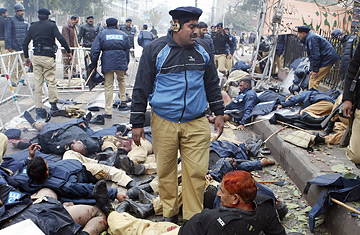
A Pakistani policeman looks around at his dead and wounded colleagues in the aftermath of the suicide bomb.
It was only a matter of time. A suicide bomber struck in the Pakistani city of Lahore today, ending a two-week lull since the spate of spontaneous violence that followed the December 27 assassination of former prime minister and parliamentary candidate Benazir Bhutto. At least 23 riot police were killed and another 58 police and passers-by were injured when a man detonated his vest packed with ball bearings outside Lahore's High Court, according to Police Superintendent Aftab Cheema. Police have recovered the suicide bomber's head, which was thrown some 100 meters across a busy commercial square by the force of the blast.
The suicide attack — a first for Lahore, Pakistan's second largest city — took place just moments before the scheduled start of a rally by lawyers protesting the rule of Pakistani President Pervez Musharraf. Witnesses described to AFP a scene of carnage and mayhem, with dead and wounded scattered among debris and body parts across the square. "The target was the police force," Punjab Police Inspector General Nasim Ahmed told reporters at the scene. "Today's bombing was to demoralize the Punjab police, but it will not. They have given their lives while performing their duty."
The first terrorist attack of 2008 on a major Pakistani city follows last year's wave of suicide bombings, which killed more than 800 in Pakistan's most violent year since partition in 1947. The bulk of the 2007 attacks came in the wake of an army raid on a pro-Taliban mosque in the capital, Islamabad, which killed nearly 100 militants. Since then, government forces and police have been the main targets of suicide bombers, with the exception of two attacks on rallies held by Bhutto's Pakistan People's Party. The first, on October 18, killed 140; the second killed Bhutto along with 30 others.
Persistent rumors about the government's complicity in the attacks on Bhutto have only escalated in recent days, even though Musharraf has invited in British investigators from Scotland Yard to determine how Bhutto died and who was behind it. Musharraf has blamed al-Qaeda affiliate Baitullah Mehsud for her death, and the government is expected to attribute today's bombing to the Pakistani Taliban leader as well. Many Pakistanis, however, consider him simply a convenient scapegoat, and in any case, ascribing the attacks to an elusive militant leader hidden in the impenetrable mountains of Pakistan's North West Frontier Province will hardy assuage mounting fears of insecurity.
Today's bombing took place on the eve of Muharram, the Islamic month of mourning, and it could augur a new series of such attacks. Muharram has historically been associated with increased violence between the country's Sunni Muslims and its Shi'ite minority. While Muharram is important to both sects, it is particularly revered by Shias who stage elaborate processions mourning the death of the prophet Mohammad's grandson in battle — the very event that eventually led to the central schism of Islam. In 2005 a bomb in a Shi'ite shrine in southwestern Pakistan killed 50. Already sectarian violence has taken hundreds of lives in the northern district of Khurram. Leaders are pleading for peace, and security agencies are boosting security at holy sites across the country.
Upcoming parliamentary elections, which were supposed to take place on January 8 but were postponed until February 18 following Bhutto's assassination, only heighten the danger. Election rallies, the cornerstone of politicking in a country where only half the population is literate and only a third have access to television, will be irresistible targets for extremists seeking to create more mayhem. Musharraf says that the government did all in its power to protect Bhutto on the day of her ill-fated rally. If the government did indeed dedicate all possible resources toward keeping Bhutto safe that day, as it claims, security forces will likely be unable to prevent further attacks such as today's.
